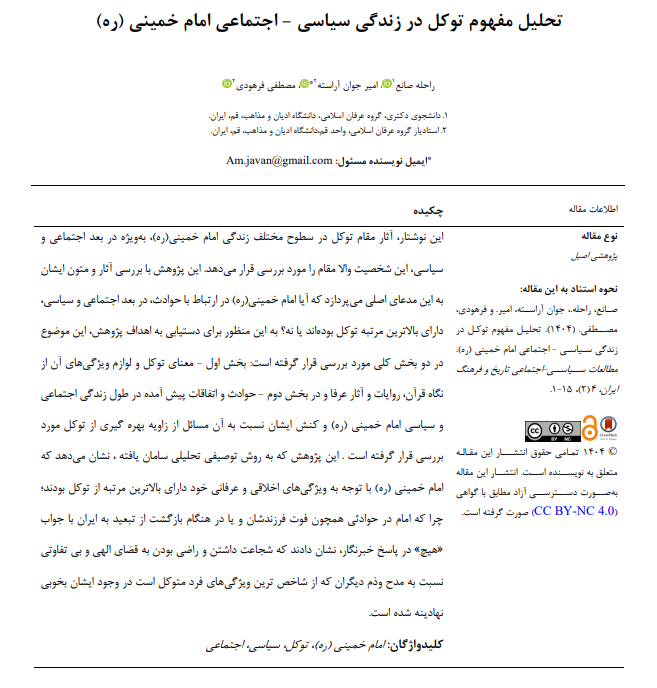Analysis of the Concept of Tawakkul in the Socio-Political Life of Imam Khomeini
Keywords:
cultural-socialAbstract
This article examines the manifestations of tawakkul (trust in God) at various levels of Imam Khomeini's life, with particular emphasis on his social and political conduct as a revered spiritual leader. The study investigates whether Imam Khomeini, in relation to social and political events, embodied the highest degree of tawakkul. To achieve this aim, the research is structured into two main sections. The first part discusses the definition of tawakkul and its essential characteristics from the perspectives of the Qur'an, Islamic traditions (hadith), and the writings of mystics (ʿurafāʾ). The second part analyzes specific incidents and events throughout the socio-political life of Imam Khomeini and his corresponding responses, particularly through the lens of reliance on divine trust. This research, conducted using a descriptive-analytical method, reveals that Imam Khomeini possessed the highest level of tawakkul, based on his ethical and mystical attributes. For instance, in the face of deeply challenging events—such as the death of his son or during his return from exile to Iran—his composed and succinct response of "nothing" to a journalist's inquiry symbolized profound courage, complete submission to divine decree, and detachment from both praise and blame. These traits, considered among the most distinguishing features of a person who truly practices tawakkul, were deeply embedded in Imam Khomeini’s character.
Downloads
References
Ansari, K. A. (1996). Manazil al-Sayrin. Darul Alam.
Ibn Manzoor, M. I. M. (1993). Arabic Language. Dar al-Fikr for Printing and Publishing and Al-Tawzi’.
Jarr, K. (1991). Farhang Laros. Amir Kabir.
Jurjani, A. i. M., & Seema, N. (1958). Al-Tarifat. Dar al-Kitab al-Ulmiya.
Khomeini, R. (1959). Sahifa Imam Collection 23 volumes. Institute for Organization and Publishing of Imam’s Works.
Khomeini, R. (1968). Sharh Junod Aql wa Jahl. Institute of Printing and Broadcasting.
Khomeini, R. (1969a). Etiquette of Salah. Publishing House of Urooj.
Khomeini, R. (1969b). Sharh 40 Hadith. Masissah Chap-e-Nashar Urooj.
Moin, M. (1992). Farhang Moin. Amir Kabir.
Mustafawi, H. (1989). Tahaqiq fi Kalamat al-Qur’an al-Hakim. Ministry of Culture and Islamic Guidance.
Naraqi, A. b. M. M. (1969). Mi’raj al-Saada. Islamic Seminary.
Raghib Esfahani, H. b. M. (1968). Language of Arabs. Nashar Darul Alam.
Rajaee, G. A. (2003). Sufferings from the Seerah of Imam Khomeini. Arooj Publishing House.
Sajjadi, S. J. (1991). Dictionary of Irfani Terms and Interpretations. Tahuri.
Salehi Manish, M. (2003). Al-Maarif Qur’an. Bustan Kitab (Anthologies of the Office of Islamic Propagation, Hoz-e-Ilma Qom).
Tabarsi, F. b. H. Majma al-Bayan fi Tafsir al-Qur’an. Dar al-Marifa.
Tabatabaei, S. M. H. (1984). Tafsir al-Mizan. Antarhat-e-Islami.
Tareehi, F. a.-D. b. M. (1983). Majma Al-Bahreen. Chap Ahmad Hosseini.
Tusi, K. N. a.-D. (1976). Ausaf al-Ashraf. Ayat Ashraq.

Downloads
Published
Submitted
Revised
Accepted
Issue
Section
License
Copyright (c) 2025 راحله صانع (نویسنده); امیر جوان آراسته (نویسنده مسئول); مصطفی فرهودی (نویسنده)

This work is licensed under a Creative Commons Attribution-NonCommercial 4.0 International License.








